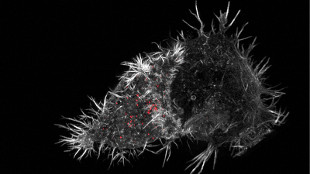 FLICKR, WELLCOME IMAGE AWARDS
FLICKR, WELLCOME IMAGE AWARDS
An oft-overlooked group of immune cells, natural killer (NK) cells seem to have a paradoxical role when it comes to viral infections—in particular, HIV. An analysis of NK cells from the blood of 13 HIV-positive women and matched controls published today (July 22) in Science Translational Medicine suggests that the more diverse an individual’s NK cell repertoire is, the more likely she is to contract HIV upon viral exposure.
Immunologist Catherine Blish and her group at Stanford University examined human NK cell diversity using a technique called mass cytometry (CyTOF), which allows researchers to examine dozens of surface proteins and other markers on individual cells at once. “You can’t calculate that diversity without having the CyTOF platform to look at all the markers,” she explained.
...


















